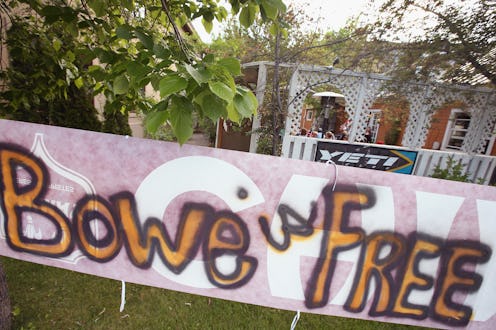In 2009, shortly after the disappearance of Bowe Bergdahl, Interpol, the international police force, received the soldier's childhood Cheshire cat mask in the mail. The woman who sent it perhaps knew Bergdahl better than anyone. In the fifth episode of Serial, host Sarah Koenig introduces us to Kim Harrison, an unassuming key player in the search for Bergdahl.
In 2009, the American soldier was captured by the Taliban's Haqqani network and was held prisoner for almost five years. Harrison wasn't a fellow member of the military, nor was she stationed anywhere near Pakistan. Instead, she was like a second mother to young Bergdahl, who worked at her family's tea shop and often considered her house as "home base," according to Koenig. Her persistent doggedness, although scoffed at by the Department of Defense, eventually resulted in one of the biggest leads in Bergdahl's case after she found herself in direct communication with a Taliban dissident.
Harrison was among the first to be informed of Bergdahl's status in June 2009. Instead of his actual family members, Bergdahl chose to list Harrison as the person to notify in case something happens to him during his time of service in Afghanistan. Koenig describes Bergdahl's relationship to Harrison, who essentially cared for him as if he were her own child.
Kim is the odd adult who actually loves teenagers. And she loved Bowe. She understood him. She worried about him. She'd do anything for him, just as she would for her own kids.
As a young child, Bergdahl met Harrison while taking fencing and ballet lessons at a local arts center that she ran, according to The Washington Post. Upon hearing the bad news, Harrison was convinced that she could do something to help rescue Bergdahl and get him home. Koenig illustrated a number of ideas running through Harrison's head including "How can I fix this, what can I do, who can I call?"
Like any mother figure would do, she took matters into her own hands and contacted Interpol, the international police force. Koenig adds that the decision to do so was wise because Interpol was already investigating the Taliban in Pakistan and had agreements with the local police forces there. Furthermore, the agency has no affiliation with political parties or the government. Logically, they were the best bet. But, in order to file a yellow report, which notified police forces of a missing person, Bergdahl's disappearance had to fall under the classification of "official police business."
That proved to be no problem for Kim. In Portland, over 7,000 miles away from Bergdahl, Harrison reported him missing to the Portland police station. She told Serial, "At the time, I knew, they're going to think I'm insane."
The woman even considered traveling to Pakistan to rescue Bergdahl herself, but characterized the intention as naive in her interview with Koenig. Eventually though, she came across a breakthrough in the case. Harrison couldn't disclose how this happened, but somehow, her phone number was relayed to a Pakistani man affiliated with the Taliban. A man speaking in Pashtun called her six weeks later until, finally, she answered the strange call.
The way she tells it, trying her best to overcome the language barrier, Harrison asked the man if he could email her instead. Moments later, she received a message in her inbox, but again, it's all written in Pashtun. Harrison, who led a relatively normal American life, found herself in a pivotal position. Her involvement in Bergdahl's case finally mattered and the Taliban dissident refused to speak with anyone but her.
After forwarding the emails to the FBI, she says, Harrison learned that the man had outlined a deal with her. In exchange for information about Bowe's whereabouts, the man asked that he and his family members be granted leave from Pakistan. Miraculously, Harrison's communication with the man was one of the most potentially valuable piece of the puzzle in the search for Bergdahl yet. However, the lead was ultimately abandoned after government agencies refused to fly the man and his eight family members to the U.S. and protect them. Because the man was affiliated with the Taliban, it would be politically incorrect to host him.
Harrison shared a statement with The Washington Post, who was the first to announce that Harrison had also received Bergdahl's "sensitive items," such as his journal and laptop. Years later, in 2014, she shared some of the contents of that journal with the public.
I hope with my whole being that what I have decided to do will have the intended effect. Love and compassion. Understanding that you cannot throw a tender artist's soul into war, and then hold them accountable to the expectations of a media machine. Unfit for combat does not mean unfit for an inspirational and exceptional life. He is worth protecting. He is courageous and noble. He is loved.
